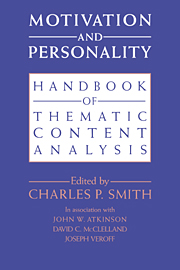Book contents
- Frontmatter
- Contents
- List of contributors
- Preface
- Acknowledgments
- 1 Introduction: inferences from verbal material
- PART I GENERAL ISSUES
- PART II CONTENT ANALYSIS SYSTEMS
- 9 The achievement motive
- 10 A scoring manual for the achievement motive
- 11 The motive to avoid success
- 12 A revised scoring manual for the motive to avoid success
- 13 The affiliation motive
- 14 A scoring manual for the affiliation motive
- 15 The intimacy motive
- 16 The intimacy motivation scoring system
- 17 Affiliative trust–mistrust
- 18 A scoring system for affiliative trust–mistrust
- 19 Power motivation
- 20 A scoring manual for the power motive
- 21 Power motivation revisited
- 22 A revised scoring system for the power motive
- 23 Personal causation and the origin concept
- 24 The origin scoring system
- 25 Explanatory style
- 26 The explanatory style scoring manual
- 27 Conceptual/integrative complexity
- 28 The conceptual/integrative complexity scoring manual
- 29 Uncertainty orientation
- 30 A manual for scoring need for uncertainty
- 31 Assessing adaptation to life changes in terms of psychological stances toward the environment
- 32 Scoring manual for psychological stances toward the environment
- 33 Self-definition and social definition: personal styles reflected in narrative style
- 34 Revised scoring manual for self-definition and social definition
- 35 Responsibility
- 36 Scoring system for responsibility
- PART III METHODOLOGY, SCORER TRAINING, DATA COLLECTION
- Appendix I Practice materials for learning the scoring systems
- Appendix II Pictures used to elicit thematic apperceptive stories
- Appendix III How to order additional practice materials
- References
- Name Index
- Subject Index
23 - Personal causation and the origin concept
Published online by Cambridge University Press: 16 October 2009
- Frontmatter
- Contents
- List of contributors
- Preface
- Acknowledgments
- 1 Introduction: inferences from verbal material
- PART I GENERAL ISSUES
- PART II CONTENT ANALYSIS SYSTEMS
- 9 The achievement motive
- 10 A scoring manual for the achievement motive
- 11 The motive to avoid success
- 12 A revised scoring manual for the motive to avoid success
- 13 The affiliation motive
- 14 A scoring manual for the affiliation motive
- 15 The intimacy motive
- 16 The intimacy motivation scoring system
- 17 Affiliative trust–mistrust
- 18 A scoring system for affiliative trust–mistrust
- 19 Power motivation
- 20 A scoring manual for the power motive
- 21 Power motivation revisited
- 22 A revised scoring system for the power motive
- 23 Personal causation and the origin concept
- 24 The origin scoring system
- 25 Explanatory style
- 26 The explanatory style scoring manual
- 27 Conceptual/integrative complexity
- 28 The conceptual/integrative complexity scoring manual
- 29 Uncertainty orientation
- 30 A manual for scoring need for uncertainty
- 31 Assessing adaptation to life changes in terms of psychological stances toward the environment
- 32 Scoring manual for psychological stances toward the environment
- 33 Self-definition and social definition: personal styles reflected in narrative style
- 34 Revised scoring manual for self-definition and social definition
- 35 Responsibility
- 36 Scoring system for responsibility
- PART III METHODOLOGY, SCORER TRAINING, DATA COLLECTION
- Appendix I Practice materials for learning the scoring systems
- Appendix II Pictures used to elicit thematic apperceptive stories
- Appendix III How to order additional practice materials
- References
- Name Index
- Subject Index
Summary
The concept of personal causation brashly pairs the physical term causation with a human adjective personal, flying in the face of centuries of philosophical controversy. The reason is that personal causation is a human experience and is fundamental to understanding human behavior. It cannot be reduced to physical causation. We can only infer physical causation because we experience ourselves as causes. Personal causation is primary and fundamental; physical causation is secondary. (For more on this see deCharms & Shea, 1976; also, deCharms, 1968/1983, 1976, 1987a, 1987b.)
I have variously defined personal causation, first as a primary motivational propensity to be effective in producing changes in the environment (deCharms, 1968/1983, p. 269). Later, and more simply, “personal causation means doing something intentionally to produce a change” (1984). Personal causation is not the name of a motive, nor is it a personality disposition. Every human being “has” personal causation, that is, experiences herself, as a cause.
Origin is the term that is central to the content analysis system presented here. It is a locution invented not to name a newly discovered kind of personality or behavior, but rather to describe a personal experience that accompanies a behavioral episode of personal causation. A definition of origin is inadequate (like saying champagne tastes like your foot is asleep).
- Type
- Chapter
- Information
- Motivation and PersonalityHandbook of Thematic Content Analysis, pp. 325 - 333Publisher: Cambridge University PressPrint publication year: 1992
- 9
- Cited by



